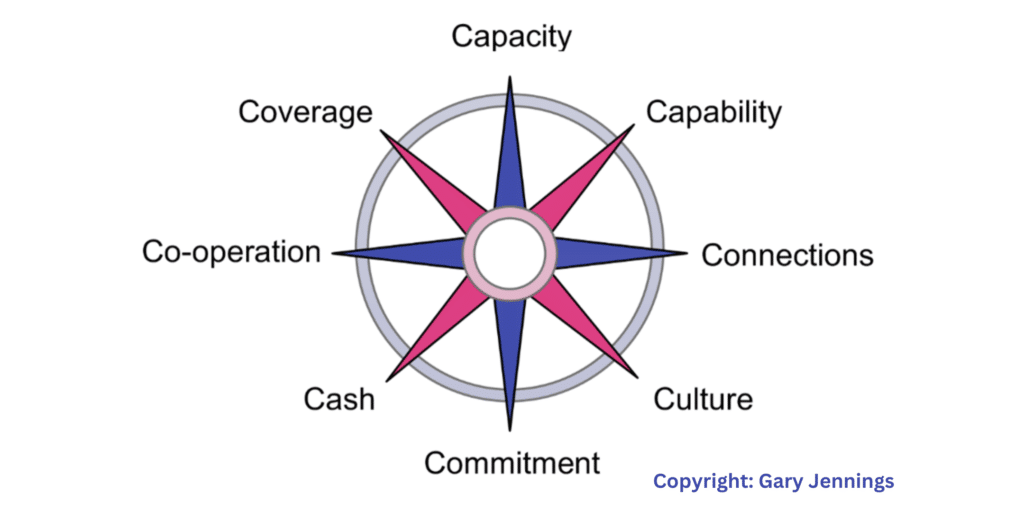Expansion Isn’t Just About More Sales
It’s easy to assume that business growth is all about getting more customers, selling more products, and making more money. But that’s only part of the equation.
For ambitious start-ups and scale-ups, growth can bring complications—in supply chains, cash flow, compliance, and capability gaps. Even the most innovative businesses can collapse under their own success if they scale without the right foundations.
That’s why the 8Cs Framework exists. Originally designed for international expansion, it has since proven valuable for any business preparing for growth. It’s a tool for assessing whether you have the bandwidth, knowledge, connections, and financial backing to scale successfully—without overstretching your business or risking failure.
If you’re thinking about scaling, these eight factors will help you ask the right questions before making the leap.
So, to make the most of this framework, it’s important to clarify what scaling really means for a business like yours:
Scaling is not just about getting more sales or revenue (but this should be the result) …it’s much more than that. Scaling a business is essentially about doing the same thing more often, and not doing lots of things in new or different ways.
Not only does this mean you are more efficient, it also means that you have strong ways of working that are align to your customers and your ambitions for your business.
The 8Cs Framework is a simple but powerful checklist that helps businesses assess whether you’re truly ready to scale. It forces you to think about the hidden risks and ensures that when you do scale, you’re doing it in a way that’s sustainable, profitable, and built for the long haul.
Is your business ready for getting to that next level? Let’s find out.
The 8Cs of Expansion: A Smarter Way to Scale Your Business
How Do You Know If You’re Ready to Scale?
Scaling any business—especially one rooted in science, technology, or innovation—isn’t just about having a great product or service. It’s about knowing whether your business can handle growth without breaking under the pressure.
For tech entrepreneurs, spinouts, deep-techs and start-ups, expanding into new markets (whether internationally or within existing territories) requires more than just ambition. It requires a structured approach to assessing risk, resources, and readiness; that’s where the 8Cs Framework comes in.
Here’s how the 8Cs can help you determine whether you’re truly ready to scale, whether it’s on home soil, or overseas:
- Capacity
- Capability
- Connections
- Culture
- Commitment
- Cash
- Co-operation
- Coverage
CAPACITY: Do You Have the Bandwidth to Grow?
Where will the time and resource come from?
Can you proactively manage the market penetration, development and growth? Remember development and growth are different things – development is to get better i.e. improve efficiency and effectiveness, whilst growth is to get bigger such as improve margins, revenue throughput and sales.
- How will you incorporate the additional requirements and demands into your current schedule?
- Can your developers, suppliers, operations, finance etc all meet expected increase in workload and the time required to engender success?
If your business can handle the increased workload without burning out your team, and if they have the time and resources to scale efficiently, this bodes well. Also, if you are prepared to manage both development (improving efficiency) and growth (increasing revenue and margins) then scalability may be realistic for you.
If your current infrastructure is already stretched, expanding might create more problems than profits so understanding where the time and resource will come from is critical to success.
CAPABILITY: Do You Have the Right Skills?
What skills and knowledge are needed?
Capability isn’t just about hiring for today—it’s also about ensuring compliance with data protection laws, logistics, finance, and regulatory standards.
- Do you have the necessary skills, knowledge, experience and expertise?
- What are the gaps and what can you do about them?
- Can you learn or buy in the expertise on a short-term agreement – to bridge the gap? If learn, how long will it take to go up the knowledge and experience curve?
- What do you need to do to ensure you have the capability to be successful?
- How will you manage data processing restrictions/requirements, GDPR, supply chains, finance, logistics, confidentiality, customer IT demands, for example?
CONNECTIONS: Are You Plugged into the Right Networks?
Who do you know, and who do you need to know?
- Are there gaps in your contact base along the entire supply chain to your end customer?
- Who must you know in sales, procurement, finance, operations, delivery, IT, data protection etc?
- How will you build and maintain contacts?
Remember: It’s not just who you know, but who knows you—especially when breaking into new markets.
CULTURE: Can You Adapt to Different Business Environments?
How will you be aligned to the market?
Culture shapes everything—from how business deals are structured to how risks and finances are managed. Ignoring it can make or break your expansion plans.
- Culture is more than just verbal, non-verbal and written communication – culture affects all business and commercial elements.
- How will you adapt, understand and work with other cultures?
- There is obviously a company culture, but what about that of your customers, your suppliers, attitudes to risk and finance etc?
Culture effects three elements; In addition to verbal, non-verbal and text-based communication, culture affects business and commercial methodology, norms and decision making, and whether your product/service is accepted and in circulation, or if it is new to market and you have to understand how it will be used.
Culture is: 1) Communication 2) Commercial methodology, finance, risk, and decision making 3) Product acceptance and usage |
Considering how cultural differences affect communication and decision-making means you may be more prepared to adapt your approach to different markets whether these are local or international.
COMMITMENT: Are You Ready to Invest in Growth?
What are you prepared to commit to?
- How will you show your commitment to your suppliers and customers without sacrificing your position or your profits?
- Will any commitments you make be reciprocal e.g. with suppliers or purchasers across the whole supply chain?
- What about your operational commitments and guarantees on performance, including supply times, marketing, customer contact, samples and sales forecasts.
Scaling isn’t just wanting to grow—it’s about making strategic, sustainable commitments.
CASH: Do You Have the Financial Backing?
Where is the money coming from?
- What about opportunity costs?
- Do you have the resource to absorb opportunity costs and meet commitments?
- How will you manage negative revenue and time lag to breakeven?
- Can you afford to do this?
- Where is the funding coming from and at what direct and indirect cost?
Cash flow is the most common reason for a company to fail and must be factored in at the outset.
CO-OPERATION: Can Your Supply Chain Handle It?
How will you work with new customers, suppliers, markets?
- How will everyone communicate and work with each other across the entire supply chain?
- Can the processes be simplified or improved?
- Can you develop processes that make business formulaic but with flexibility built in to meet cultural expectations and variances between deals?
Growth depends on a well-oiled supply chain. Without clear communication, scaling up can become a logistical nightmare.
COVERAGE: Can You Stay on Top of It All?
Can you actively manage the expansion?
- How will you ensure that you are not diluting your focus on current customers and all other aspects of your business?
- How will you follow up regularly?
- How will you meet the data protection, certification, location or regulatory restrictions?
- What are YOUR constraints in time, focus, energy and input to business development?
- Can you run your expansion strategy concurrently with your current business and not negatively affect all other parts of the business?
Scaling up should feel like an evolution, not a distraction from your core business.
Making the 8Cs Work for You
The 8Cs aren’t meant to be a rigid framework—they’re meant to spark critical thinking. Some business models are theoretical and written based on academic research of large companies. If you find this is the case with any model, including the 8Cs, then look at the bits that don’t work for you – and adapt them.
Many small businesses never take the time to pause and assess their own setup. The 8Cs create a structure to help you step back and ask the right questions before jumping into your next stage of evolution.
The key is to continuously evaluate your position, strategy, and partners—so that when you do scale, you’re doing it on your own terms, with the right foundations in place.
So, are you really ready to scale? If not, When?
Now is the time to start asking the right questions. Remember it is all about asking questions of yourself, of your business, of your supply chain, of your decisions, or where you want to be and what you want to achieve.
There may be no right or wrong answer, but at least you’ve assessed it.

About the author
Gary Jennings is Innovation Director at The EpiCentre Haverhill; an innovation centre where he delivers inclusive business support to the companies there. He is also a Non-Executive Director and continues to run his own SME working with international companies to grow and develop their business:
“I’ve been in the international arena for 35 years, and have run my own business for over 20 years, always taking a practical hands-on approach. I created the 8Cs framework as part of my national work with SMEs wishing to grow in overseas markets to simply assess where they are and what they need to do to get to where they want to be. I then realised that this framework applies to UK-focused businesses across their supply chain – from suppliers to customers. I always ensure that what I say and advise is what I do in my own business every day – this way I know it works.”
To find out more about The EpiCentre and how it can support your business, or to get in touch with Gary, please visit www.epicentrehaverhill.co.uk
To find out more about Office Space | The EpiCentre | Haverhill, Cambridge (epicentrehaverhill.co.uk)
To find out more about Lab Space | The EpiCentre | Haverhill, Cambridge (epicentrehaverhill.co.uk)
To find out more about Our Members | The EpiCentre | Haverhill, Cambridge (epicentrehaverhill.co.uk)
To find out more about Business Support | EpiCentre | Cambridge, Haverhill (epicentrehaverhill.co.uk)



